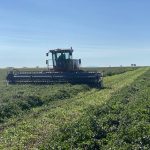UAP Canada has picked up federal approval to expand the label on its Serenade fungicide for use in canola and pulse crops.
Serenade, made by Davis, Calif.-based crop protection firm AgraQuest and distributed in Canada by UAP, is a broad-spectrum fungicide derived from a natural soil bacterium, Bacillus subtilis strain QST 713.
The product is registered in Canada for suppression of diseases across various row and horticultural crops, including sclerotinia stem rot, downy mildew, powdery mildew, white mould, early blight and other rots, moulds, blights and leaf spots. It’s used in vegetables, fruit, nut and vine crops in other countries and particularly by organic growers.
Read Also

India slaps 30 per cent import duty on yellow peas
India has imposed a 30 per cent duty on yellow pea imports with a bill of lading date on or after Nov. 1, 2025.
Offering “multi-site” modes of action, Serenade could be used by pulse growers as part of a rotation to extend the useful life of other chemistries, UAP national marketing manager Janet Porchak said in the distributor’s release Tuesday.
“In canola, it offers broad-spectrum, preventative control that’s both effective and ecological.”
As well, she said, the product “has the added bonus of certifications that can help keep the door open to more domestic and export markets for your crops.”
The product’s organic certifications include the Organic Materials Review Institute (OMRI), the U.S. Department of Agriculture’s National Organic Program (NOP), Japan’s JAS organic standard and the Washington State Department of Agriculture’s organic designation.
Serenade’s bacteria produce three separate groups of lipopeptides, biochemicals which work on the leaf surface and offer the activity of three different chemical classes, AgraQuest said.
AgraQuest’s Sarah Reiter said in UAP’s release that growers find Serenade’s “zero-day pre-harvest interval and minimum re-entry intervals” to be its key advantages.











